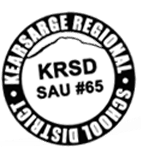Competency Education in Practice: Kearsarge Regional High School Spotlight
CompetencyWorks Blog
 This spotlight originally appeared in the CSSR October 2014 Newsletter.
This spotlight originally appeared in the CSSR October 2014 Newsletter.
In 2005, New Hampshire became the first state to abolish the Carnegie Unit and mandate that by SY ’08-’09 all high schools measure credit according to students’ mastery of course competencies rather than seat time. CSSR works with a number of New Hampshire schools through the i3 NETWORK to build the pedagogical and leadership capacity to take on this transformational work. Kearsarge Regional High School is one of those i3 NETWORK schools.
Kearsarge Regional High School | North Sutton, NH
The road to Competency Education at Kearsarge Regional High School (KRHS) coincided with the adoption of school-wide learning expectations associated with the school’s core values and beliefs. Academic Expectations include: effective and clear communication; critical thinking; and information, technology, and media literacy. Social and Civic Expectations include: initiative and productivity; responsibility and accountability; and collaboration. Students are assessed on these expectations through each of their courses but receive a separate grade than that earned through the demonstration of course competencies.
Each course at KRHS has 3-5 specific competencies. In most instances these competencies were determined through department-wide conversations to ensure vertical learning progressions. Several departments such as math and science utilize a combination of broader skill-based competencies with much more specific course-based competencies. While writing competencies, educators also evaluated the number and type of formative and summative assessment opportunities. The resulting program includes multiple and varied opportunities for students to demonstrate mastery of competencies. i3 NETWORK site coordinator Chris Geraghty shared that this system allows students to better understand grading practices, and to self-monitor competencies in which they are stronger or weaker: “the system allows students to very specifically target certain skills and have clarity about what they need to do to improve.”
Performance assessments and senior project are big wins stemming from the transition towards a competency-based system. The senior project is a high school graduation requirement, is entirely student-directed, and takes place outside of any designated course time. Students select an essential question, partner with a mentor outside of the school community to guide their progress and regularly check-in with a school based advisor to report on project benchmarks. Examples include a student who paired up with a local welder in the community to learn about the science behind the welding process, identified career pathways and skills for employment, and ultimately created a weather vane. Another student interested in the colonization of Mars completed a review of NASA literature, designed a colony proposal, and created a scale model of the colony using 3D printing.
Geraghty’s advice for other schools and districts looking to take on similar work is simple: make sure there is a clear purpose behind your work. The process of establishing a clear purpose however was not so easy. Geraghty emphasizes the importance of ensuring that staff, students, families and community members understand competency-based learning and assessment – focusing on the depth and transferability of skills and knowledge that students will have once they graduate.
Learn more about Kearsarge here.
Anna Fazekas is a school change coach with The Center for Secondary School Redesign. Ms. Fazekas began her career in education as a high school science teacher in the Chicago Public Schools. She is the co-author of: First Response: A Guide to Designing and Delivering Classroom Interventions (2013) and Building a Pathway to the Future: Maximizing High School Guidance and Advisory Support (2011). Ms. Fazekas also edited CSSR’s i3 New England Network Technical Assistance Platform, an interactive online resource that tells the five-year story of school transformation in thirteen schools in the i3 New England Network for Personalization and Performance. Anna can be contacted at [email protected]